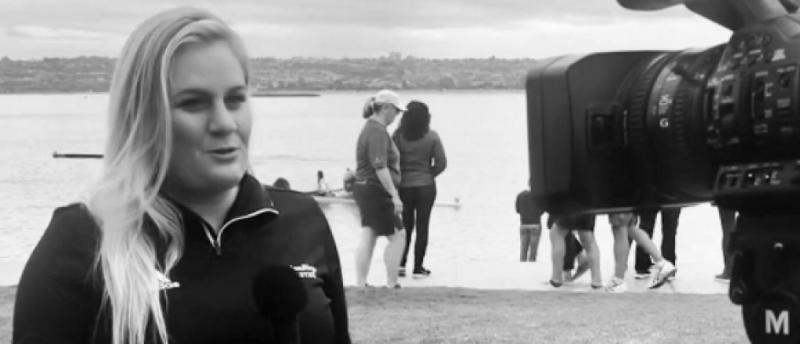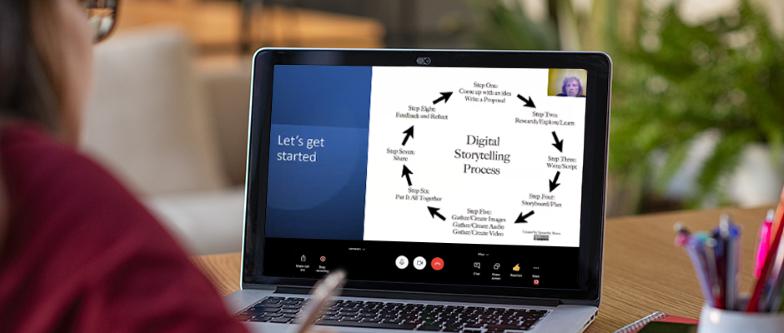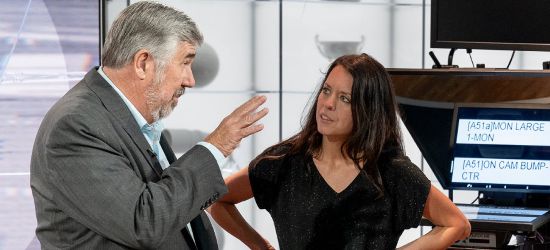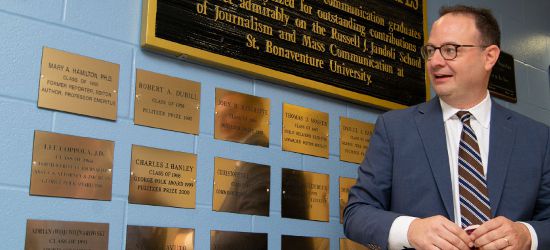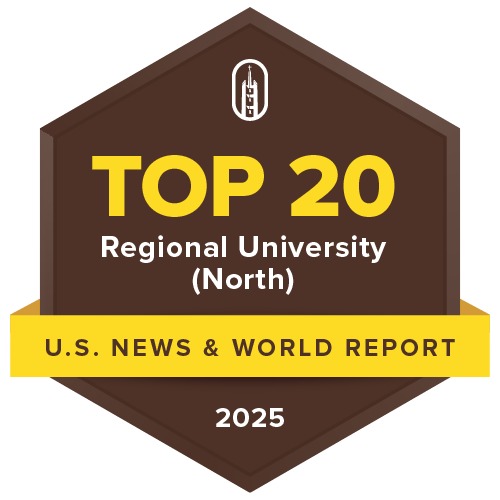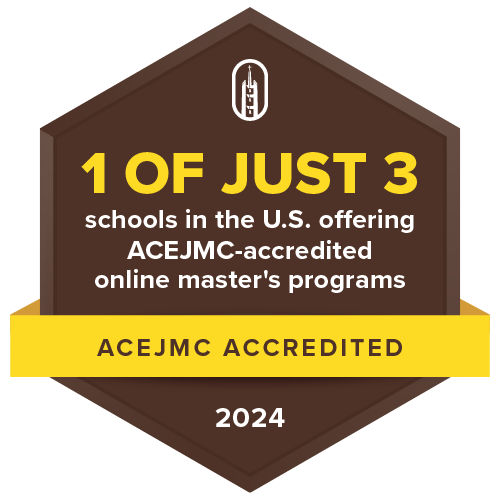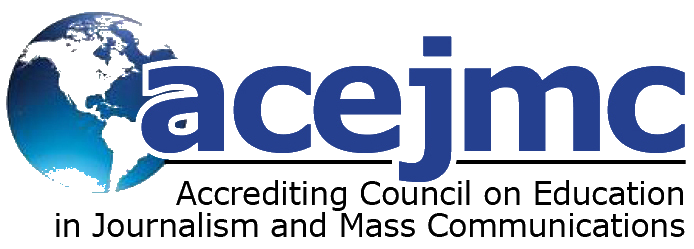Tell the stories that matter across digital media
St. Bonaventure University’s (SBU) online Master of Arts in Digital Journalism goes beyond traditional journalism skills, such as writing, reporting, and editing—competencies that are still essential—and allows you to master the art of digital media and connect with audiences on a wide range of platforms.
Offered at the ACEJMC-accredited Jandoli School of Communication, the digital journalism master’s program offers you an unparalleled education, enriched by its long legacy of journalistic excellence that adheres to the highest standards in the industry, including in areas such as curriculum, diversity, inclusion and ethics.
Our program combines traditional journalism with technology, all shaped within a moral and ethical framework reflecting our Franciscan values.
About The Program
-
SBU’s online Master of Arts in Digital Journalism combines traditional journalism with cutting-edge technology, all shaped within a moral and ethical framework reflecting our Franciscan values. This program prepares you to thrive in today’s fast-paced media landscape by mastering both storytelling and the digital tools to bring stories to life.
Students will learn how to:
- Integrate digital news into journalism.
- Create engaging content through photography, video, design, and audio.
- Code with HTML, CSS, JavaScript, and other tools to master digital storytelling.
- Report in real-time via social media.
- Build your personal brand as a journalist.
- Analyze user data to optimize content
- Develop, research, and execute a major journalism project.
-
-
-
-
SBU’s online Master of Arts in Digital Journalism combines traditional journalism with cutting-edge technology, all shaped within a moral and ethical framework reflecting our Franciscan values. This program prepares you to thrive in today’s fast-paced media landscape by mastering both storytelling and the digital tools to bring stories to life.
Students will learn how to:
- Integrate digital news into journalism.
- Create engaging content through photography, video, design, and audio.
- Code with HTML, CSS, JavaScript, and other tools to master digital storytelling.
- Report in real-time via social media.
- Build your personal brand as a journalist.
- Analyze user data to optimize content
- Develop, research, and execute a major journalism project.
Journalism Curriculum Highlights
Since 2013, St. Bonaventure has offered graduate degree programs in a dynamic environment created for the online learner. This approach to academic excellence is guided by the university’s ongoing on-campus commitment to quality education for its students since its inception in 1858.
For the complete online journalism degree curriculum, please fill out the form and download a program guide.
This is the foundational course in digital journalism. Students will contextualize the role of digital journalism in our rapidly changing society and media landscape. There will be a focus on how diverse audiences interact with journalism and how journalists cover issues of race, ethnicity, gender, gender identity, sexual misconduct and other contemporary issues. The course also covers the forces affecting change in the industry and how flexibility, agility and adaptability are crucial for digital journalists and open up many career possibilities.
This course will examine the ethical issues journalists face doing their job and how that comports with the highest ideals of the profession. The intersection of ethics and law and major principles of media law will be discussed including prior restraint, privacy, libel and copyright. How journalists can use public records is also a focus.
The practice and study of using social media for journalism. The course will include an overview of social media platforms and using them to cover news with speed and accuracy, including for breaking news. Also discussed are ways to use social media to build a brand and promote journalistic work.
This course helps journalists understand data and how to use it to inform the public. Students will explore databases and how to use digital tools to analyze and present data.
This course focuses on the web programming languages used to create interactive digital storytelling packages that include multiple media elements. Students will learn HTML, CSS, JavaScript and jQuery, among other tools for interactive storytelling, and apply those to produce significant journalistic work.
A three-course sequence (JMC 701, 702, and 703) in which students research, report and present a major digital journalism project. The project is designed to let students push their journalistic storytelling in a long-form project where they will incorporate the many techniques, tools and ideals taught throughout their master’s program.
The final project should be the most profound piece of journalism students have produced to date.

Ready to Learn More?
Next Term: Summer 2026
Start Date: May 18, 2026
Limited seats are available. Secure your spot today!
Digital Journalism Major at Bona's
Why St. Bonaventure University’s Master’s in Digital Journalism?
Alums & Careers
St. Bonaventure has a rich journalism tradition, and our graduates take coveted roles in leading media companies across the country, including ESPN, USA Today, The New York Post, NBC News among many other organizations. Our alums take on roles as editors, writers, reporters, columnists, producers, senior-level management, and roles as a digital journalist.
Rankings
ACEJMC Accreditation
St. Bonaventure’s School of Communication is accredited by the Accrediting Council on Education in Journalism and Mass Communication (ACEJMC).
When you graduate from an ACEJMC-accredited program you can be assured that your program adheres to the highest standards, including in areas such as curriculum, diversity and inclusion, full-time and part-time faculty and learning outcomes.
As an accredited school, we are
- one of only 19 private university communication schools to be so accredited
- one of just three offering accredited online graduate programs.
Learn From Our Dedicated Faculty

Anne Wojtaszek Lee
Lecturer, Jandoli School of Communication
Anne Lee is a Lecturer in Journalism, Co-editor for TAPinto Greater Olean, and Assistant Director of the Francis E. Kelley Oxford Program.
Learn More
Aaron Chimbel
Professor and Jandoli School Dean, School of Communication
Chimbel has taught a wide variety of journalism classes and focuses on the industry shift to digital delivery of news, as well as broadcast journalism.
Learn MoreFrequently Asked Questions
No, this program is designed to teach all of the foundational skills that are critical to a successful career in journalism. Through this program, you can leverage St. Bonaventure University’s world-class reputation in journalism and accomplished faculty to master the craft of digital journalism.
The online Master of Arts in Digital Journalism is a 30-credit hour program and takes about a year and a half to complete. Courses are offered during 7-week terms and are designed for the working professional to complete while still working full time.
You can find more information and start your application on our Apply Now page.
The online Master's in Digital Journalism program costs $815 per credit hour. The total investment for this program is $24,450 for 30 credit hours, excluding fees.
A master’s degree in journalism prepares you for a wide range of careers such as copywriter, staff writer, reporter, producer, podcast host, grant writer, editor, technical writer, and other careers in the marketing and communications field. The digital world has opened new doors for journalists and broadened the global conversation – but today’s professionals have to be equipped with the full scope of knowledge to be effective content creators across all media types, including podcasts, social media, video streaming, and mobile apps.
No, the Master of Arts in Digital Journalism program is offered 100% online, with courses delivered asynchronously to offer you flexibility with your schedule.
While you can do the entire program online, you are welcome and invited to come to our beautiful campus in Western New York for your graduation, or to stop in anytime you might be in the Olean, NY, area.
Hear From a Student
"Not only do you have this amazing insight from your own instructors, you're going to be in this master class with leading names in the industry, and you're going to be able to talk to them and ask them questions and get their insight as to what's happening in the industry."
Hear from St. Bonaventure graduate Richard Vara as he discusses how the online master's in digital journalism program provided him with the tools and connections needed to excel.

